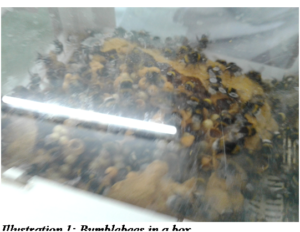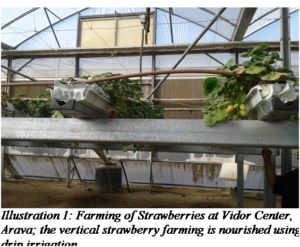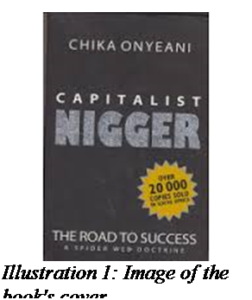The first time I saw a bumblebee it was in a form of packaging. One kibbutz runs a company called Biobee and farms these and uses them on their organic farm and sells them to farmers who would like to increase their yields using cross-pollination. In the middle of the desert where there is a Moshav, there is a need. The Kibbutz that makes drip pipes under the company Netafim, is also part of the equation:

So, a tomato farmer buys bees from Biobee and manages his water supply using the drip pipes from the pipe maker. Goods and services circulate enough times in the network to make the system sustainable, water is used efficiently and there’s always a harvest. This started decades ago and today there are star-ups that have taken the challenge to make new products and services such that the net grows wider.
The power of networks – spin-offs
A while ago, while I was starting to question my place under the stars I came across a book by Chika Onyeani called Capitalist Nigger.
The book at times purports the idea that black communities globally have a significantly low wealth collectively, in comparison to other racial communities: the White (including Jewish communities), Chinese, Indian communities. Now, based on these observations, let me make my case:
Simplistically speaking, for some communities, services and goods are traded enough times in the same community before they trade with another community than others, and this is not limited to primary and secondary goods but extends also to tertiary services which require specialized skills; before it leaves the community. In contrast, most of Africa’s water, energy and food solutions are said to be possible because the continent, has an endowment of vast and numerous natural resources and yet remains mostly poor and inhabited mostly by indigenous communities. This is the case because urban development and rural underdevelopment could be likely happening at the same rate, if not development leading the track.

The challenge here is that because of scarcity of opportunities and a lack of support mechanisms for sustainable business practice, lack of financial education and training in some rural communities and most importantly a lack of empowerment because most indigent communities heavily rely on state funding for economic emancipation, there is often a disconnect and because of this it gets cumbersome trying to keep the most skilled members of the continent in the continent, or in developing communities because affluent areas are more appealing in contrast to the most remote places. Of course, in some instances, mobile platforms like M-Pesa have shown to be successful not only as innovations but also as providing access to finance to rural communities such that more money circulated via Africa through platforms such as M-Pesa sent from relatives in the diaspora, in contrast with foreign aid.While this is a positive instance, a lot still requires to take action because rural communities tend to face these:
- The gaps of knowledge between skilled and unskilled persons are far wide so access to centres of innovation may be limited for rural communities
- Access to finance may have changed, however finance alone may not be the only solution – more activities need to happen that develop rural communities of the benefits of empowering education
- Markets that often have an established presence usually work in silos: in one community a group of liquor stores may collaborate with the police to protect themselves against stock theft, just as farmers would, just as tuck shop owners would; this helps the businesses guarantee the mitigation of certain risks but keeps the development unilateral and non-expansion driven (low growth). This in turn means that larger markets may not absorb them, and as a result they can remain small or die out because they are not appealing to larger markets.
- Skills and education, are still a priority and while the tug-of-war between the student population and state organs about making tertiary education free is not gathering any resolutions in some countries, the issue still remains that commodifying education deprives other civilians of fairly competing in the space requiring skills and some formal qualification for an individual to function in society.
Back to the issue of trade-offs, it then becomes a challenge to have rural communities enjoy the benefits of trade-offs from their own networks in order to keep goods and services in circulation long enough for the communities to thrive. There are quite a number of challenges that are arising in the continent and for the most part, there are a lot in our very own communities which can be addressed by making use of the resources available at our disposal. However, this needs education of some sort to be imparted and for sustainable ways of bringing innovation centres closer to the people. While this is true for some communities that the challenges of access to innovation centres and start-up hubs are near non-existent despite the presence of market opportunities made available by natural or artificial occurences, there needs to be an observation into the limitations of access to these environments (e.g. innovation centres) by some community members as well as the lack of availability of such environments (ones which can offer opportunities) in rural areas. Solutions to these challenges can be a good way to foster value trade-offs which can lead to creation of new markets.

The road in this regard is rather winding. From an organizational perspective, the ability to be able to foster internal trade relations in Africa such that goods and services will be able to feature in the same community a significant amount of times before going to other parts of the globe, could start of first with a lot outsourcing to outside of Africa for the scales to be tipped in favour of African development where the skills might be available, the manufacturing might be cheaper, and the logistical issues are less stringent. At best, lots of generations are likely to pass before getting into a position where goods and services, across various levels of sophistication, can be enjoyed by the collective prior to the exits of cash, goods and services.
Closing shop, I say…
It is going to be quite a while before solutions to these challenges will bring about some kind of change. This is not to say that it is not happening. It is necessary, however, to consider the reality that for the most part the many political systems that have come and gone have had significant impacts on the current state of affairs because these get inherited and passed down from one leader to another; and while there are buzzwords every now and then about the impacts that ought to be made by big business and allies of nations, sustainability as regards having an established local culture of internal trade that is not visible makes it challenging to to realise real socio-economic development in rural communities. The mere fact that most of these communities cannot afford simple items like shoes, sanitary wear for girl children; and sophisticated skills like a doctor or engineer or at times, educating professionals; simply means that there is a lot that needs to be addressed in order to realise sustainable development of rural communities in the continent. If farming can happen in a desert, what else can?
